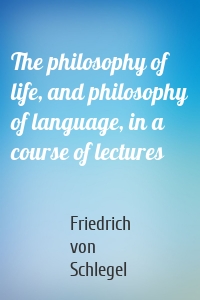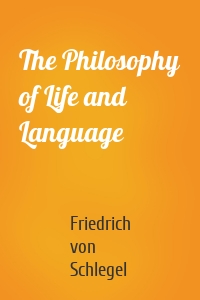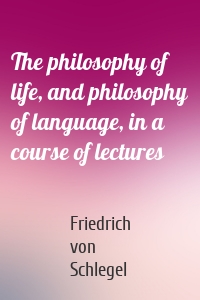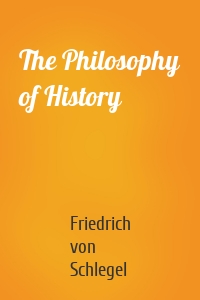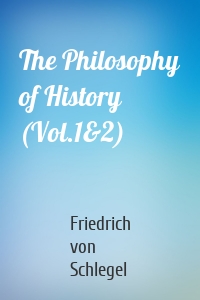Friedrich von Schlegel
5 кн.
The philosophy of life, and philoso...
The Philosophy of Life and Philosophy of Language in a Course of Lectures is a book by German poet and philosopher Friedrich von Schlegel, containing 25 lectures concerning Epistemology, Philology, and mostly Lebensphilosophie, which emphasises the meaning, value and purpose of life as the foremost focus of philosophy. Inspired by the critique of rationalism, Lebensphilosophie emerged in 19th-century Germany as a reaction to the rise of positivism and the theoretical focus prominent in much of...
| Автор | Friedrich von Schlegel |
The Philosophy of Life and Language
The Philosophy of Life and Philosophy of Language in a Course of Lectures is a book by German poet and philosopher Friedrich von Schlegel, containing 25 lectures concerning Epistemology, Philology, and mostly Lebensphilosophie, which emphasises the meaning, value and purpose of life as the foremost focus of philosophy. Inspired by the critique of rationalism, Lebensphilosophie emerged in 19th-century Germany as a reaction to the rise of positivism and the theoretical focus prominent in much of...
| Автор | Friedrich von Schlegel |
The philosophy of life, and philoso...
"The philosophy of life, and philosophy of language, in a course of lectures" by Friedrich von Schlegel (translated by A. J. W. Morrison). Published by Good Press. Good Press publishes a wide range of titles that encompasses every genre. From well-known classics & literary fiction and non-fiction to forgotten−or yet undiscovered gems−of world literature, we issue the books that need to be read. Each Good Press edition has been meticulously edited and formatted to boost readability for...
| Автор | Friedrich von Schlegel |
The Philosophy of History
Excerpt: «In the first chapter „History of Greek Poetry,“ Schlegel speaks of the religious rites and mysteries of the primitive Greeks, and of the Orphic poetry to which they gave rise. Contrary to the opinion of many scholars who, though they admit the present form of the Orphic hymns to be the work of a later period, yet refer their substance to a very remote antiquity, Schlegel assigns their origin to the age of Hesiod. Enthusiasm, he says, is the characteristic of the Orphic poetry—repose...
| Автор | Friedrich von Schlegel |
The Philosophy of History (Vol.1&2)
Excerpt: «In the first chapter „History of Greek Poetry,“ Schlegel speaks of the religious rites and mysteries of the primitive Greeks, and of the Orphic poetry to which they gave rise. Contrary to the opinion of many scholars who, though they admit the present form of the Orphic hymns to be the work of a later period, yet refer their substance to a very remote antiquity, Schlegel assigns their origin to the age of Hesiod. Enthusiasm, he says, is the characteristic of the Orphic poetry—repose...
| Автор | Friedrich von Schlegel |


